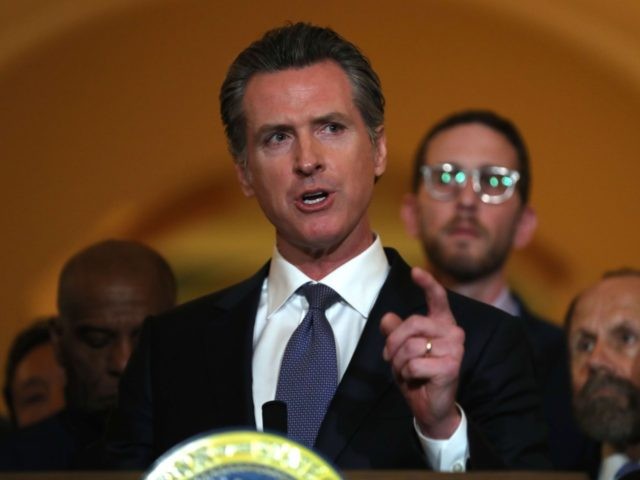California Gov. Gavin Newsom declared a moratorium on the state’s implementation of the death penalty on Wednesday, temporarily sparing the lives of 737 convicted killers and provoking a public outcry.
“The intentional killing of another person is wrong and as Governor, I will not oversee the execution of any individual,” Newsom said in a statement accompanying his executive order. “Our death penalty system has been, by all measures, a failure. It has discriminated against defendants who are mentally ill, black and brown, or can’t afford expensive legal representation. It has provided no public safety benefit or value as a deterrent. It has wasted billions of taxpayer dollars. Most of all, the death penalty is absolute. It’s irreversible and irreparable in the event of human error.”
Newsom’s blanket moral statement — “the intentional killing of another person is wrong” — appears to ignore the widely-accepted precept that intentional killing is often morally acceptable when carried out by soldiers during wartime; by those entrusted with protecting public safety; by individuals, in self-defense; and by public authorities, in punishing murder.
Some critics agreed with Newsom’s criticism of the flaws in the justice system, but also pointed out that the death penalty had also punished some of the state’s most egregious crimes, and that even liberal California voters had supported it at the polls in 2016, the same year the state overwhelmingly supported Hillary Clinton over Donald Trump for president.
Joel Fox, editor and published of the “Fox and Hounds Daily” political blog, wrote in an essay titled, “A Government of Newsom, by Newsom“:
Gov. Gavin Newsom has vetoed a law approved by the people … in passing Proposition 66 in 2016 while a second initiative on that ballot to abolish the death penalty [Proposition 62] was defeated.
Weight should be given to Newsom’s point that a number of death row occupants are eventually released because they were wrongly convicted. But there are clear cases of murderers who committed the most heinous crimes. The argument of justice in those cases still holds. It is the ultimate penalty for the ultimate, gruesome crime against victims and their loved ones.
The governor’s action has to be viewed in the larger context not of his personal opposition to the death penalty but as his duty as an elected official to uphold the law. The people have clearly spoken and it is the responsibility of the chief executive of the state to execute the laws.
…
Ours is a government of the people. If a single individual who temporarily holds the reins of power, even in the highly controversial and oft debated issue of the death penalty, can override that basic concept of government by the people then a severe crack appears in the foundation of the democracy.
Some families of murder victims supported Newsom’s decision, but many were bitterly opposed. The Los Angeles Times reported several such reactions (original links):
Cindy Rael was home Wednesday morning watching television when the news turned personal — Gov. Gavin Newsom was halting executions in California, including for the man who killed her daughter Brandi eight years ago, shooting her and lighting her body on fire in front of her children.
“I was pissed off,” said Rael. “This man brutally murdered my daughter and now he’s going to just get life in prison. I have to live with this every day of my life…. I am totally against [Newsom] doing away with it.”
…
“California just became a dictatorship today,” said Tami Alexander, wife of former NFL player Kermit Alexander, vocal proponents of the effort to fast track the death penalty. “It is not about the process, about democracy, the journey, a vote.”
The couple has waited more than three decades for the execution of Tiequon Cox, who shot and killed her husband’s mother, sister and two nephews in South Los Angeles in 1984. Her husband could not even begin to comprehend the governor’s decision, she said, adding that she felt for the families of victims like Marc Klaas, whose daughter Polly was kidnapped and strangled to death by a man who flipped the father off in court.
Some critics compared Newsom’s use of executive power to that of President Donald Trump — a form of condemnation in the state that leads the so-called “Resistance.”
Newsom’s order can be reversed by his successor, though the state has not carried out any executions since 2006.
Joel B. Pollak is Senior Editor-at-Large at Breitbart News. He is a winner of the 2018 Robert Novak Journalism Alumni Fellowship. He is also the co-author of How Trump Won: The Inside Story of a Revolution, which is available from Regnery. Follow him on Twitter at @joelpollak.

COMMENTS
Please let us know if you're having issues with commenting.